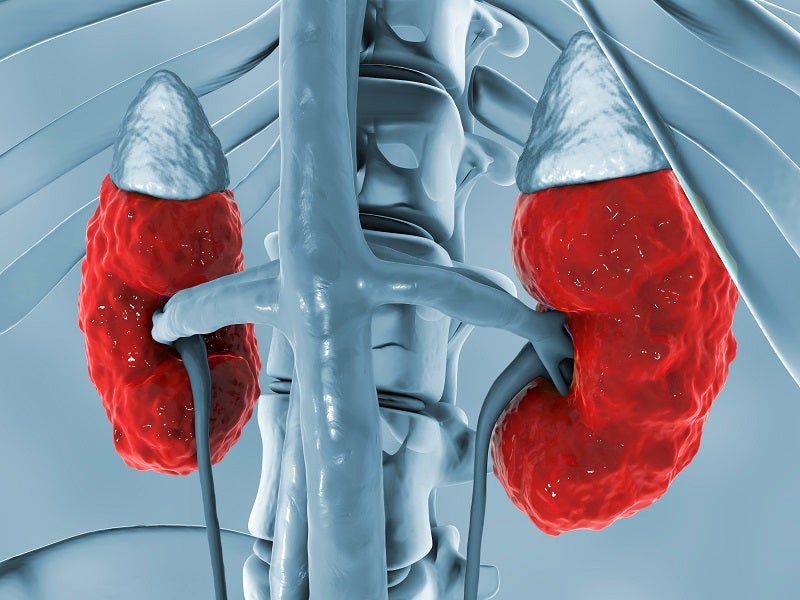Jesduvroq (daprodustat) is an oral, once-a-day treatment for adults with anaemia due to chronic kidney disease (CKD) who have been on dialysis for at least four months.
Developed by UK-based pharmaceutical company GSK, Jesduvroq is a hypoxia-inducible factor prolyl hydroxylase (HIF PH) inhibitor available in five dosage strengths: 1mg (grey-coloured), 2mg (yellow-coloured), 4mg (white-coloured), 6mg (pink-coloured), and 8mg (orange-coloured) as biconvex, round, film-coated tablets.
Regulatory approvals for Jesduvroq
Daprodustat was approved under the brand name Duvroq in Japan in June 2020. The European Medicines Agency (EMA) validated the marketing authorisation application (MAA) for daprodustat and accepted it for review in March 2022.
The US Food and Drug Administration (FDA) approved the drug under the brand name Jesduvroq in February 2023.
Causes and symptoms of anaemia due to chronic kidney disease
CKD can be referred to as progressive loss of kidney function. Anaemia is a usual complication of CKD and is associated with increased morbidity, mortality, and poor quality of life.
There are several causes of anaemia of CKD. When kidneys are damaged, it reduces the production of erythropoietin (EPO), a hormone responsible for signalling the bone marrow to make red blood cells (RBCs). The inadequate production of EPO leads to decreased production of RBCs, resulting in less oxygen supply to organs and tissues.
In addition to inadequate development, the RBCs of individuals with anaemia and CKD also stay for a shorter period than expected in the bloodstream, leading the blood cells to die faster.
People with anaemia and CKD usually have reduced nutrient levels such as iron, vitamin B12, and folate, which are essential to make healthy RBCs.
Other causes of CKD-related anaemia include blood loss, mainly if individuals are treated with dialysis for kidney failure, infection, inflammation, and malnutrition.
Anaemia associated with CKD develops slowly and may have few or no symptoms in early kidney disease. Symptoms of anaemia in CKD may include fatigue or tiredness, shortness of breath, ashen skin, fatigue, body aches, chest pain, dizziness, fainting, irregular heartbeat, and headaches.
CKD affects 700 million people worldwide among which an estimated one in seven patients develops anaemia. Approximately 39 million people are living with CKD in the US, of whom six million are affected by anaemia.
Jesduvroq’s mechanism of action
Daprodustat belongs to a novel class of oral medicines to treat adults on dialysis with anaemia of CKD. It reversibly inhibits the oxygen-sensing prolyl hydroxylase enzymes to stabilise the hypoxia-inducible factors. The activity can lead to increased transcription of the EPO and other genes involved in the correction of anaemia.
Clinical trials on Jesduvroq
The FDA approval of Jesduvroq was based on the positive outcomes from the ASCEND programme, which included five Phase III clinical trials for the assessment of daprodustat for the treatment of anaemia of CKD across the disease spectrum. More than 8,000 patients were recruited in the programme, who were treated for up to 4.26 years.
Within the programme, the global, multi-centre, randomised, active-controlled phase III clinical trial ASCEND-D enrolled 2,964 patients with dialysis-dependent CKD with anaemia to evaluate the safety and efficacy of Jesduvroq.
The patients were randomised to receive either Jesduvroq or erythropoietin stimulating agent (ESA), a standard treatment option. A uniform iron management protocol was initiated across both arms of the study.
The primary endpoints of the study were the mean change in haemoglobin from baseline to the evaluation period, that is from week 28 to week 52, and the time to first adjudicated major adverse cardiovascular events (MACE), using a non-inferiority comparison to ESA for both endpoints.
The drug improved or maintained haemoglobin within target levels of 10g/dL to 11.5g/dL for the patients. The results showed that Jesduvroq was non-inferior to the standard of care therapy in the risk of MACE in adults with anaemia due to CKD who were on dialysis.
The most common adverse effects reported in patients treated with Jesduvroq were hypertension, thrombotic vascular events, and abdominal pain.





